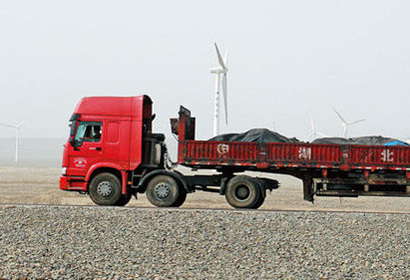(Ecns.cn) –In one day, northwest China's Xinjiang Uyghur Autonomous Region received contracts worth 1 trillion yuan ($154.6 billion) from Chinese state-owned enterprises (SOEs) for local investment.
On August 20, a meeting designed to attract centrally-administered SOEs to support Xinjiang was held in Urumchi. More than 120 heads of SOEs attended the meeting and nearly 90 project contracts were signed.
At the meeting, Wang Yong, chairman of the State-owned Assets Supervision and Administration Commission (SASAC), said that the volume of investment in Xinjiang will double over the period of the 12th Five-Year Plan (2011-2016). All of the projects, with an investment of more than 700 billion yuan ($108.2 billion), will kick off before 2012, he also said.
Crippled economy
In March 2010, the central government urged 19 provincial-level regions to help promote economic development in Xinjiang. As a leading force, state-run SOEs entered Xinjiang one by one, creating projects that have brought tremendous change to the area.
According to statistics released by the SASAC of the Xinjiang Uyghur Autonomous Region, by the end of 2010 a total of 44 central SOEs had invested 573.9 billion yuan ($88.7 billion) in developing its petroleum and petrochemical, coal, power and metallurgical industries, making a profit of 55.2 billion yuan ($8.5 billion) and paying taxes of 48.4 billion yuan ($7.5 billion). In such a short period, the SOEs contributed to over 70% of the region's industrial value-added output.
However, many experts say that the SOEs vying with each other to make investment in Xinjiang is not just an answer to the government's call, but more importantly a competition for local resources.
According to data quoted from the official website of the Xinjiang local government, local reserves of petroleum, natural gas and coal occupy respectively about 30%, 34% and 40% of the country's reserves.
Jiang Jiemin, chairman of PetroChina, announced at the meeting that his company will invest 300 billion yuan ($46.4 billion) into the development of Xinjiang in the next decade. That's equal to its total investment in Xinjiang in the past 30 years.
As is clearly seen, apart from tapping into the region's abundant natural resources, central SOEs are also being encouraged to play a part in the construction of roads, railways, water and electricity infrastructure to provide social benefits to Xinjiang.
However, the development of such industries may further deteriorate the crippled economy of Xinjiang, as the current economic structure is already imbalanced in favor of heavy industry. According to Wang Ning, head of the Economic Research Institute of the Xinjiang Academy of Social Sciences, in 2010 Xinjiang's heavy industry was about 86.34%, whereas light industry represented only 13.66%.


















